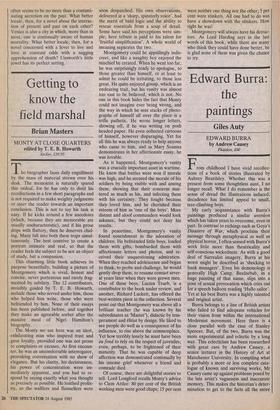Getting to know the field marshal
Brian Masters
MONTY AT CLOSE QUARTERS edited by T. E. B. Howarth
Secker, £10.95
The biographer faces daily engulfment by the mass of material strewn over his desk. The memoirist is naturally spared this ordeal, for he has only to distil his recollections in a few short paragraphs and is not required to make weighty judgments or steer the reader towards an important conclusion. This is not to say his task is easy. If he kicks around a few anecdotes (which, because they are memorable are usually uncharacteristic), and if his prose drips with flattery, then he deserves chid- ing. Many fall into both these traps simul- taneously. The best contrive to create a portrait intimate and real, so that the reader feels the subject to be not an object of study, but a companion.
This charming little book achieves its purpose beautifully, building a picture of Montgomery which is vivid, honest and concise, never portentous and rarely frag- mented by subtlety. The 12 contributors, invisibly guided by T. E. B. Howarth, include those who served under him, those who helped him write, those who were befriended by him. None of their essays has been published before, and together they make an agreeable sorbet after the massive meal of Nigel Hamilton's biography.
The Monty we see here was an alert, exhilarating man who inspired trust and . gave loyalty, provided one was not prone to complaints or excuses. At first encoun- ter, he was an uncomfortable interrogator, provoking conversation with no show of elegance. But his clarity, his decisiveness, his power of concentration were im- mediately apparent, and you had to re- spond by saying exactly what you thought as precisely as possible. He loathed prolix- ity, so the wafflers and flannellers were soon despatched. His own observations, delivered in a 'sharp, spinsterly voice', had the merit of bald logic and the ability to rescue essentials from a soup of detail. Some have said his perceptions were sim- ple; here tribute is paid to his talent for 'fruitful simplification'. A whole world of meaning separates the two.
Montgomery could be appallingly indis- creet, and like a naughty boy enjoyed the mischief he created. When he went too far, he was surprisingly ready to apologise, to those greater than himself, or at least to admit he could be irritating, to those less great. He quite enjoyed gossip, which is an endearing trait, but his vanity was almost too vast to be believed, which is not. No one in this book hides the fact that Monty could not imagine ever being wrong, and the way in which he sent stacks of photo- graphs of himself all over the place is a trifle pathetic. He wrote longer letters, showing off, if he was writing on posh headed paper. He even collected cartoons of himself, however disparaging. Yet for all this he was always ready to help anyone who came to him, and as Mary Soames demonstrates in her affectionate essay, he was lovable.
As it happened, Montgomery's vanity was a crucially important asset in wartime. He knew that battles were won if morale was high, and he secured the morale of his soldiers by being visible with and among them, showing that their concerns mat- tered as much as his, and infecting them with his certainty. They fought because, they loved him, and he cherished their esteem of him as 'one of the boys'. More distant and aloof commanders would look askance, but they could not deny his results.
In peacetime, Montgomery's vanity found nourishment in the adoration of children. He befriended little boys, loaded them with gifts, bombarded them with affectionate letters and photos, and re- ceived their unquestioning admiration. When they reached adolescence and began to think, to probe and challenge, he would gently drop them, to resume contact sever- al years later when they were grown men. One of these boys, Lucien Trueb, is a contributor to the book under review, and another, Richard Luckett, has offered the best-written piece in the collection. Several point out that Montgomery was above all a brilliant teacher (he was known by his subordinates as 'Master'), didactic by tem- perament and elitist by design. He liked to see people do well as a consequence of his influence, to rise above the commonplace. Yet how terribly lonely he must have been au fond to rely on the respect of juveniles; even, perhaps, to be frightened of their maturity. That he was capable of deep affection was demonstrated continually by his intense grief whenever a friend and comrade died.
Of course, there are delightful stories to tell. Lord Longford recalls Monty's advice to Clem Attlee: 80 per cent of the British• working men were good chaps; 15 per cent were neither one thing nor the other; 5 per cent were stinkers. All one had to do was have a showdown with the stinkers. How right he was!
Montgomery will always have his detrac- tors. As Lord Harding says in the last words of this book, while there are many who think they could have done better, he is glad none of them was given the chance to try.










































 Previous page
Previous page